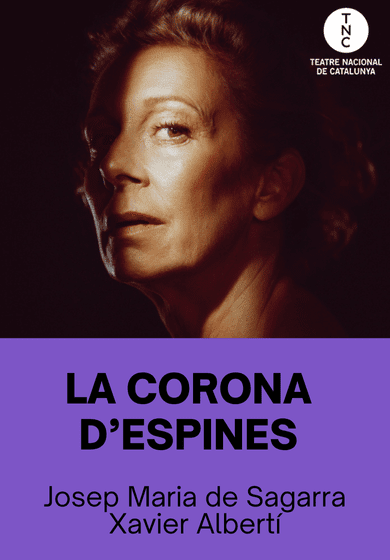
The smell of Sagarra – Revista Teatre Barcelona
the poet Joseph Maria de Sagarra he had a very fine sense of the form and background of his theater. According to the director Xavier Albertíwhich prepares The crown of thorns in his return to the Great Hall of the TNC, not enough justice has been done to the work of an author who advocated writing lines in verse to provide the actors with the tools of theatrical tradition. Today, Albertí trusts that the technique of diction in verse will be taught again to future performers. Everyone thinks they deserve recognition and adulation, medals and crowns. now, the crown of thorns, that of the Way of the Cross, is the only one that no one covets (and that many women have historically endured in silence).

Àngels Gonyalons heads the cast of the show directed by Xavier Albertí at the TNC
Sagarra premiered The crown of thorns in 1930, a moment that marked an epochal change: it was the end of the dictatorship of Primo de Rivera and airs of the Second Republic were felt; the right to suffrage for women (which would finally happen in 1932) was also beginning to resonate. Albertí remembers the version that Ariel Garcia Valdés presented at the Drama Center of the Generalitat, now 30 years ago. He admits that he looked better in the role of Mr. Bellpuig (a grasshopper who tries to take advantage of a noble title to save his financial troubles) played by Joseph Maria Pou, that the role of the butler Marta who played a celebrated Angels Poch. now, Angels Gonyalons will endow the paper with a tone of denunciation “of violence against women’s bodies”, confirms the director. For Albertí, just recovering Sagarra’s verse is enough to rescue the piece. But now, in addition, the impunity of the patriarchy is being shown. The work is set in 1793, with the echo of the guillotine of the French Revolution (1789), while the commercialization of noble titles is attended to. Sagarra observes the discredit of the aristocracy before the capricious ambition of the new bourgeoisie.
Albertí, in his time as artistic director of the TNC, wanted to recover some lesser-known pieces of the playwright such as Silvia’s fortune, Birds and wolves i Galateaattributed to an influence of contemporary European theatre. He also recovered a historical and proved that Rosa Maria Sardà direct The hostel of glory. She said that she would continue the chemotherapy sessions if she found the artistic team to raise the production, “she was excited”. In the end, he did not find the team and the TNC invited Jordi Prat and Coll that he made a new adaptation of The Rambla de les florists (TNC, 2019). The iconic actress died in 2020.
Sagarra, to compensate for the lack of a powerful Catalan theater in the Baroque era, chose to write in heptasyllabs and hendecasyllables to provide replicas that resonated appropriately, which provided a constant rhythm. On the other hand, the consonant rhyme was reserved for the monologues of the protagonists and left the rest in free rhyme, explains Albertí. Joan de Sagarra (son of the playwright) was an executor of the father, always pushing him to return to the scene. For Albertí, his recent death should not lead to the oblivion of an author who has had too many prejudices to consider him a collaborator of Francoism. Albertí regrets that the recovery operation of Josep Pla it has not happened with Sagarra, even if censored articles were published during Franco’s time. In 1936, Sagarra left Catalonia warned by the Minister of Culture, Ventura Gassoland guarded by armed men: The satirical verses which he had published in The good black were the cause of the murder of the headmaster, Jose Maria Planes. Sagarra’s life was in obvious danger. In that escape he marries his betrothed, Mercè Devesaand embark on a trip to Polynesia, as the travel book records The blue routethat Pablo Ley i Joseph Galindo they would turn into action on the scene (Joan de Sagarra calculated that it was conceived on that trip).
Xavier Albertí i Lluís Homar have been at the helm of Teatro Clásico for the last five years. They were clear that it was necessary to incorporate drama in Catalan into the repertoire of the state theater company. They did it punctually in some recitals (In Songs of love, heartbreak and pirates they introduced replicas of Guimera; a Soul and word the music of Mompou; a The empty temple they incorporated Llull i Jacinto Verdaguer), but they still had to raise one Guimera (the first major Catalan reference on the international billboard) at the Teatro Clásico.
More information, images and tickets:









